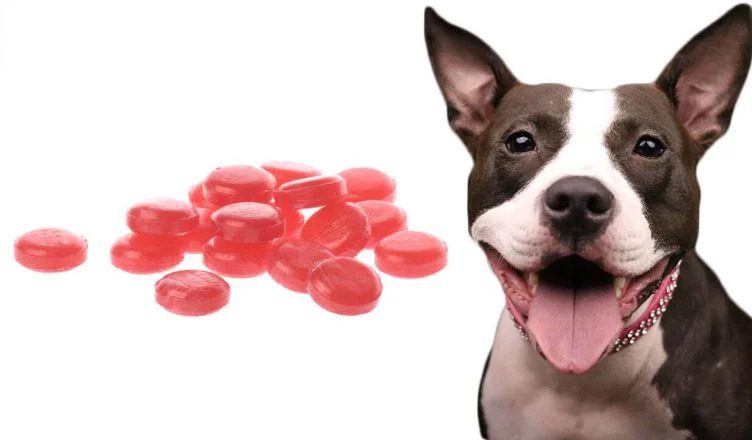Whether or not your dog can have cough drops is dependent upon the ingredients used in the drops. According to Animal Poison Control Center ASPCA, if a pet has swallowed cough drops, the first course of action is to check the ingredients list. But it’s best for dogs to not eat any cough drops at all since the risks are much greater than the benefit. Many cough drops contain sugar, menthol, eucalyptus oil, colors, and flavor.
These ingredients can lead to gastrointestinal issues such as diarrhea, vomiting, stomach pain, and nausea. Other cough drops could also contain toxic ingredients such as xylitol and Benzocaine. These ingredients, while safe for humans, can be dangerous or even lethal to dogs. Let’s take a look at how these ingredients can be harmful to dogs.
Also, check out Can Dogs Cough?
Cough Drops: 6 Harmful Ingredients You Shouldn’t Give Your Dog
1. Sugar
Sugar isn’t exactly toxic to dogs but in large amounts, it could lead to various health issues. Excess sugar can lead to pancreatitis, diabetes, and hyperglycemia. It can also lead to obesity and dental issues. If your dog is diabetic and/or overweight, then sugar can exacerbate the condition. Thus, you wouldn’t want to give any extra sugar to your pooch.
2. Xylitol
Xylitol is a sugar substitute. It’s found in many popular brands of candies, gum, toothpaste, mouthwash, and diet foods. While the sweetener is safe for humans, it can be toxic to pets. When xylitol enters the body of a pet, it affects the liver and kidneys by increasing blood sugar levels and releasing insulin. This can lead to hypoglycemia (low blood sugar) and even liver failure.
3. Benzocaine
Benzocaine, an anesthetic used in cough drops, is commonly found in products that relieve sore throats and pain. Ingesting this ingredient can cause side effects such as vomiting, diarrhea, and increased heart rate. In higher quantities, it can also cause anemia in dogs – termed Methemoglobinemia. This is a rare condition where the blood cannot receive oxygen due to the chemical change of hemoglobin to methemoglobin. The color of the gums can go from pink to bluish red and dogs will appear pale and lethargic.
And finally, if ingested in large amounts, it can lead to seizures and even death. Additionally, benzocaine can pose a risk for aspiration. This is especially dangerous for dogs with weak or weak respiratory systems like dogs with collapsed tracheas.
4. Menthol
Menthol is a common ingredient in cough drops and is a cough suppressant. It’s an organic compound found in mint plants that renders a cooling sensation when rubbed or ingested. Menthol can also be toxic to dogs and large amounts can lead to liver failure. While adult dogs might not have severe reactions, it could be fatal for young or small pups. The “quick cooling” action of menthol can lower blood oxygen levels making it hard for a pup to breathe.
5. Eucalyptus Oil
Eucalyptus oil, also known as “cough drop oil,” is the main ingredient in many cough drops. While it has anti-inflammatory properties, it can cause irritation in dogs’ upper respiratory tract. And like with Menthol, ingestion of large amounts of Eucalyptus oil can lead to upper respiratory tract irritation and even liver failure.
6. Additives
Flavorings and dyes are common additives in cough drops. While not directly toxic, these additives can cause stomach upset, gastrointestinal issues, or even lead seizures. Small amounts of these ingredients aren’t usually harmful, but it’s best to avoid them altogether if possible.
Additional Issues with Eating Cough Drops
1. Choking
If your dog does ingest a cough drop, it can be very dangerous. If they swallow the whole drop, there’s a possibility that the drop could become lodged in their throat or esophagus; thus, leading to choking. This is more common in smaller breeds such as Chihuahua’s, Pomeranians, and Yorkies. In this case, your best course of action is to attempt to perform a safe vomit. If this is not possible, your pet should be taken in for a vet appointment. If they’re treated, they’re usually at no risk of long-term complications. In the meantime, you’ll need to monitor their temperature and feeding habits.
2. Intestinal Blockage
If your pet does eat cough drops, it’s possible that the product could cause an intestinal blockage. A blockage is when food does not pass through the digestive tract normally. Some dogs might even swallow the whole wrapper along with the drops by mistake. In this case, your pet should be taken in to see a vet as soon as possible.
Conclusion
Do not give cough drops to your dog unless you’re sure about the ingredients. But still, it’s recommended that you don’t feed any type of drops to your dog. In fact, it’s always best to consult a veterinarian before giving any type of medication to your pet. And if your dog does ingest cough drops, stay calm and call the vet. Try and provide as much information as possible such as the ingredients and how much was ingested. And finally, monitor their behavior and look for any signs of distress or discomfort.
Thank you for reading the article.
To explore more, check out other articles that we have covered on Dog Medication.
Have you ever given cough drops to your dog? How did they react? Did they have gastrointestinal problems? We would love to hear from you. Please share with our community by leaving a comment below!
